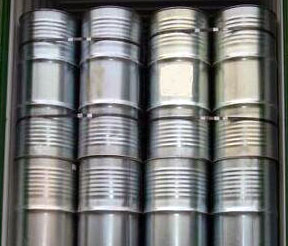Tetrahydrofuran

|
Physical and chemical properties |
Color and odor status: colorless, viscous liquid with the smell similar to ether |
||
|
Toxicity: low toxicity |
Flammability: extremely flammable |
||
|
Density: 0.887g/cm3 |
Volatility: volatile |
||
|
Boiling point: 66 ℃ |
Stability: stable |
||
|
Melting point: -108.5℃ |
Acidity: weak acid |
||
|
Spontaneous ignition point: 321 |
Stickiness: small |
||
|
Flash point: -14℃ |
|||
|
Solubility: soluble in most organic solvents such as water, ethanol, ether, acetone and benzene. |
|||
|
Code |
CAS: 109-99-9 |
HS: 2932110000 |
EINECS: 203-726-8 |
|
Uses |
Used as a solvent, organic synthesis, medicine, and has a wide range of Uses. Used as a chromatographic analysis reagent and an intermediate for the synthetic pesticide phenbutyltin. It can be directly used to make synthetic fibers, synthetic resins, and synthetic rubbers. It is also a solvent for many polymer materials, precision tapes and electroplating industries. It is also used to make adiponitrile, adipic acid, hexamethylene diamine, succinic acid, butanediol, etc. Tetrahydrofuran is an important organic synthesis raw material and a solvent with excellent performance. It is especially suitable for dissolving PVC and butyl aniline. It is widely used as surface coatings, solvent for anticorrosive coatings, printing inks, tape and film coatings, and used as reaction solvents. |
||
|
Hazard category |
3.1 Class flammable chemicals |
||
|
Fire-fighting measures |
Hazardous characteristics: It can react with acids. Reacts violently with potassium hydroxide and sodium hydroxide. Its vapor is heavier than air and can spread to a considerable distance in a lower place, and will ignite when it encounters a fire source. Extinguishing method: use foam, carbon dioxide, dry powder, sand to extinguish the fire. Fire with water is ineffective. Spray water to cool the container. If possible, move the container from the fire scene to an open place. If the container in the fire scene has changed color or produces sound from the safety relief device, it must be evacuated immediately. |
||
|
Emergency treatment |
Skin contact: Take off contaminated clothing, rinse the skin thoroughly with soap and water Eye contact: Lift the eyelid, rinse with running water or normal saline, and seek medical attention Inhalation: quickly leave the scene to a place with fresh air. Keep the airway open. If breathing is difficult, give oxygen and seek medical attention Ingestion: Drink enough warm water, induce vomiting, seek medical attention |
||
|
Packaging, storage, transportation |
Packed in galvanized iron drum, 180kg/drum, stored in a cool, ventilated warehouse, away from fire and heat sources. The storage temperature should not exceed 30 ℃. The packaging must be sealed and not in contact with air. Use explosion-proof lighting and ventilation facilities. It is forbidden to use mechanical equipment and tools that easily generate sparks. |
||
Next product: Methylal

